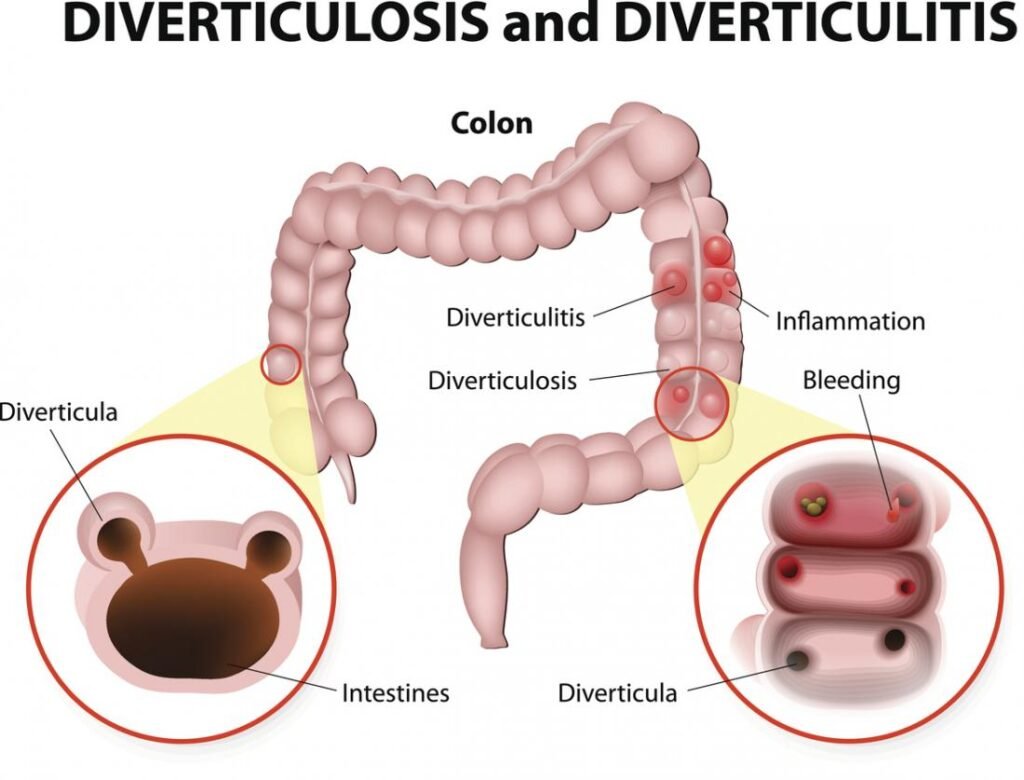
Diverticulosis
A small sac occurs in the intestine known as diverticulosis. Infection and inflammation of the diverticula are known as diverticulosis.
Diverticulosis is noninfectious.
Diverticulitis is mainly caused by bacterias named escherichia coli.
It can spread to the peritoneal cavity or the surrounding tissues. In advanced cases, diverticula can burst out due to overexpansion caused by severe infection.
Diverticulosis Causes :
Chronic Constipation can cause diverticulosis. Lack of fiber intake in the diet can cause the protrusion of the sac. Fibers are useful for softening the stool. Lack of fiber intake can cause constipation and while straining it can cause pressure on the colon that results in diverticulosis.
Escherichia coli is a gram-negative bacteria that causes infection and inflammation of the diverticula.
Obesity is also one of the main causes of diverticulosis.
Smoking.
Alcohol consumption.
Diverticulosis Types :
Acute diverticulitis: In the acute form of diverticulitis there are one or two attacks of infection or inflammation occurs.
Chronic diverticulitis: in the chronic form of diverticulitis infection goes down to the colon and never gets cured after that.
Symptoms :
- Intestinal obstruction.
- Obstinate constipation.
- Severe pain in the lower abdomen.
- Tenderness of the abdomen.
- Fever due to infection.
- Leukocytosis.
- Low hemoglobin level.
Complications :
Abscess
Rupture of diverticula due to infection or over-expansion of
diverticula.
Infection can spread to the peritoneal cavity.
Blood in the stool.
Intestinal obstruction.
Diagnosis:
- An ultrasound of the abdomen
- MRI
- CT scan of the abdomen and pelvis.
Preventions :
1. Increase the intake of fibers in the diet.
2. Take plenty of fluid.
3. Do exercise regularly.
4. Limit the intake of fatty food and red meat in the diet.
Homeopathy management :
Colocynth: colocynth is indicated for abdominal pain causing violent, cutting, or radiating type of pain relief by applying pressure. Tenderness and soreness of the intestines. Passes stool with flatulence and pain. The character of the stool is jelly-like.
Nux vomica: nux vomica is well indicated for a patient with constipation. The patient is not satisfied after passing stool. There is the constant urging of passing stool. Consistency of the stool is hard and the stool is brown and black color. There can be little blood present in the stool.
Bryonia alba: Bryonia alba is well indicated for abdominal pain with constipation. Severe constipation with dryness of stool. The stool is hard and dry.
Belladonna: belladonna has good results in abdominal pain with inflammation of the intestines caused by infection. Pain in the abdomen is associated with constipation.